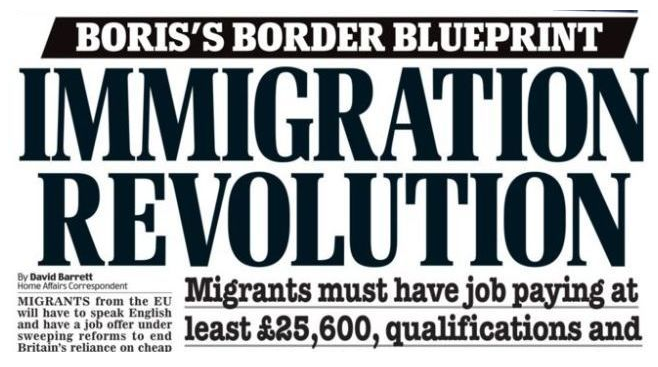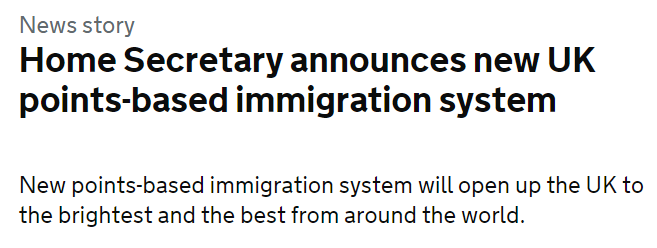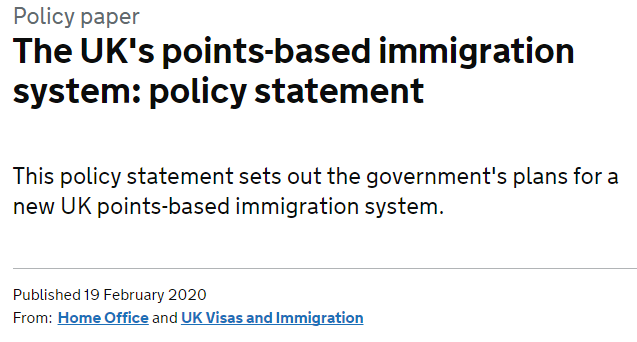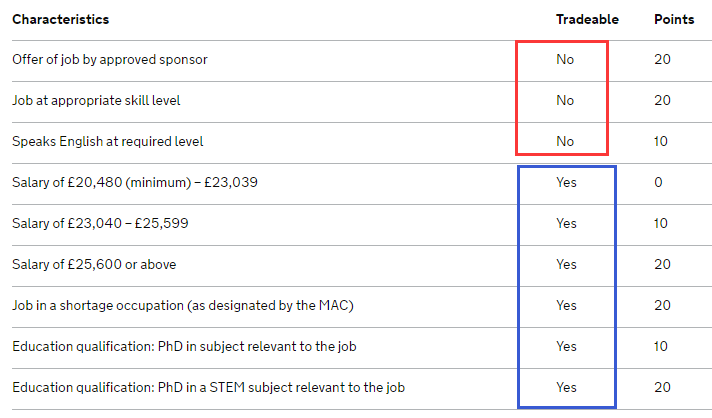C4.57 UK Points-Based Immigration System
UK's New Immigration Policy: Points-Based Immigration System
Following Brexit, the UK has launched a series of initiatives, including the new immigration policy. This newly introduced points-based immigration system has been rated by multiple media outlets as the biggest immigration reform officially announced by the UK for the first time since 1973

On 19th February 2020, the UK Home Office officially announced the launch of a new immigration policy: the UK's Points-Based Immigration System with a 70-point threshold.
This is the first time the UK has introduced a points-based immigration system, which will take effect on 1st January 2021 and be open to applicants worldwide. All individuals applying for a UK work visa must score 70 points to be eligible.
The points-based system will assess applicants based on factors such as specific skills, qualifications, salary, or occupation, and visas will only be granted to those who meet the required score. The points threshold is carefully designed to attract talents that the UK needs. Skilled workers must meet a series of relevant criteria, including specific skills and English language proficiency, to work in the UK. All applicants are required to achieve the 70-point requirement, and in line with recommendations from the Migration Advisory Committee (MAC), the minimum salary threshold in the UK will be set at £25,600 per year.
The new points system will also raise the skill threshold for skilled workers. Those wishing to live and work in the UK now need to achieve an equivalent level through qualification exams, rather than the current degree-level requirement. This will provide greater flexibility and ensure UK businesses have access to a large pool of skilled workers.
Consistent with the government's manifesto commitments, there will be no specific route for low-skilled workers. It is estimated that 70% of the existing EU workforce will not meet the requirements for the skilled worker route, which will help reduce the overall number of immigrants in the future

Why is the new immigration policy being introduced?
The UK Home Office stated that the policy aims to end free movement of people, regain control of Britain’s borders, and restore public trust. However, EU citizens residing in the UK can still apply for settled status through the EU Settlement Scheme until June 2021, with the deadline for applications set at 31st December 2020.
Furthermore, this new immigration policy aligns with clear messages from the 2016 referendum and the 2019 general election. It seeks to end the UK’s reliance on cheap, low-skilled labor, boost productivity, and strengthen technological capabilities. At the same time, it aims to reduce overall immigration levels, tighten security measures, attract more outstanding talents, and ensure a better experience for all those coming to the UK.
The policy is global in scope and prioritizes individuals with high skills and exceptional talent, including scientists, engineers, and academics.
The UK has also launched the Global Talent Scheme, which is open worldwide and offers the Global Talent Visa. This means highly skilled scientists and researchers can come to the UK without having a job offer first. For detailed information about this visa, please refer to another article

On 19th February 2020, the UK Home Office’s statement on the new points-based immigration system included the following information:
Scope of the points-based system
Salary and skill thresholds for skilled workers
Pathways for high-skilled workers
Reducing the overall number of low-skilled workers
Visa application process
UK border crossings
Engagement and expansion
Migration Advisory Committee’s analysis of the points-based system
Key reminder from Shishengmiao: Applicants must achieve a total of 70 points, with the first three items (worth 50 points) being mandatory requirements to apply for a work visa. As long as the total points add up to 70, regardless of which items contribute, each item will not be scored repeatedly.
As shown in the picture below, the points assessment table for immigration:

In the picture above, the three "No"s in the red boxes are mandatory requirements:
Have a job offer from a UK government-approved sponsor – 20 points
Possess suitable job skills – 20 points
Meet the required English language proficiency – 10 points
These three mandatory requirements sum to 50 points. In other words, you already have 50 points at this stage, and only need an additional 20 points to meet the criteria.
All the "Yes"s in the blue boxes below are additional scoring items, which are non-mandatory. They can be combined or fulfilled in any way:
Annual salary of £20,480 - £23,039 – 0 points
Annual salary of £23,040 - £25,599 – 10 points
Annual salary of £25,600 or above – 20 points
Shortage occupation (designated by the Migration Advisory Committee (MAC)) – 20 points
Qualification: Doctoral degree relevant to the job – 10 points
Qualification: Doctoral degree in a STEM-related subject – 20 points
Reminders from Shishengmiao:
STEM stands for Science, Technology, Engineering, and Mathematics.
The shortage occupation list will be compiled by the MAC and released in due course.
The standards for job skills implement the MAC’s recommendations, lowering the skill threshold from RQF6 to RQF3.
In short, you can meet the 70-point requirement by earning an annual salary of £25,600, or by combining any other items that add up to 70 points.
For example, if you already have the 50 mandatory points, you just need to accumulate 20 points from any combination of the blue-box items to reach 70 points. That is, 50 mandatory points plus any combination of additional points, totaling 70 points.
For instance, a university researcher working on a STEM (Science, Technology, Engineering, and Mathematics) project wants to come to the UK but has an annual salary of only £22,000 (below the general minimum salary threshold). They can still enter the UK if they hold a STEM-related doctoral degree. Similarly, if you are a nurse with an annual salary of only £22,000, you can also enter the UK because nursing is a shortage occupation (subject to MAC designation).
Key reminder from Shishengmiao: Applicants must achieve a total of 70 points, with the first three items (50 points) being mandatory to apply for a work visa. As long as the total points add up to 70, regardless of the combination, each item will not be scored repeatedly.
To summarize what Shishengmiao says about obtaining a UK work visa: Be sponsored, have skills, speak English, meet the salary requirement, hold a high qualification, or work in a shortage occupation



